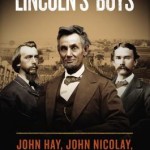 Everyone knows Abraham Lincoln, in part because of the diligent work done by his two secretaries – John G. Nicolay and John Hay. But little has been done to illuminate the two men themselves. Zeitz has done us all a favor by accomplishing just that.
Everyone knows Abraham Lincoln, in part because of the diligent work done by his two secretaries – John G. Nicolay and John Hay. But little has been done to illuminate the two men themselves. Zeitz has done us all a favor by accomplishing just that.
Subtitled “John Hay, John Nicolay, and the War for Lincoln’s Image,” Lincoln’s Boys is a history of Lincoln, a history of the times, and a history of Lincoln’s two private secretaries. One quickly comes to realize that “secretary” is a misnomer, as Nicolay and Hay’s responsibilities not only included managing and responding to correspondence, but also trusted diplomats who went on sensitive missions to confer with key generals and politicians across the country. They also controlled access to the President, such as a chief of staff would do today.
The first of five sections looks at Nicolay and Hay’s separate upbringings and how they came to become part of Lincoln’s inner circle after his election in 1860. We get a sense of their differing demeanors as well as Lincoln’s own attitudes toward life and the major issues of the day – slavery and the secession of southern states. Part II largely takes place during the White House years. In Part III we follow the two young men following Lincoln’s assassination as they embark on diplomatic lives in Europe and back home, start families, and come into their own.
In Part IV, Zeitz brings us into the long process of writing the 10-volume history of Lincoln that largely defines these two men. It also defines Lincoln. This is perhaps the most critical part of the book as the author explains how the early biographies of the stricken President either were self-aggrandizing fanciful reinterpretations by those seeking to enhance their own place in history, or were creative reinvention by the South to makes slavery disappear as the cause of war. The long gap between the end of Lincoln’s life and when Nicolay and Hay (and also Herndon) finally produced their biographies left a vacuum that was filled with erroneous “history.” The two secretaries, with Robert Lincoln supporting them, sought to write the definitive history that corrects the record and firmly established the idea of “Our Ideal Hero.” They were uniquely positioned to do that.
While Nicolay largely devoted his later life to Lincoln’s memory, Hay went on to an active political career capped by over seven years as Secretary of State to two presidents (one of whom, William McKinley, was also struck down by an assassin’s bullet). In a superbly written and easily readable book, Zeitz has brought these two under-appreciated men into view and shined the light on them. Lincoln would be happy for them.
I highly recommend this book.
David J. Kent is a lifelong Lincolnophile and is currently working on a book about Abraham Lincoln’s interest in science and technology. He is also the author of Tesla: The Wizard of Electricity and a soon-to-be-released ebook on Nikola Tesla: Renewable Energy Ahead of Its Time.
Other Abraham Lincoln book reviews:
Lincoln Unbound by Rich Lowry
Lincoln in New Orleans by Richard Campanella
Lincoln’s Other White House by Elizabeth Smith Brownstein










